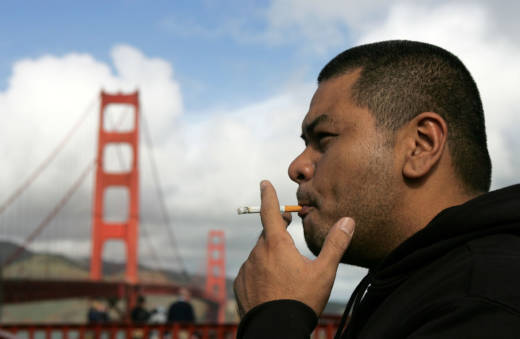“This is a big effect,” said Dr. Stanton Glantz, a researcher at UCSF's Center for Tobacco Control Research and Education. “I have felt for a long time where we’re getting to the point in California where smoking is so low that a couple of good shoves like this one, and we might be rid of it.”
Glantz and other tobacco experts cautioned that it is still far too early to make definitive conclusions: It’s difficult to draw inferences from two months of data, as both suppliers and consumers are still figuring out what they can and can’t afford.
Knowing that prices were about to rise, tobacco distributors and smokers also rushed to stockpile as many cigarettes as possible the month preceding the tax hike, deflating the April and May figures. California cigarette distributors sold nearly 104 million cigarette packs in March, by far the most of any month in the last two years.
But even after adjusting for stockpiling, the tax hike appears to be having a major impact: Cigarette sales still dropped 23 percent year-over-year for the three-month period, including the pretax run-up.
Experts say cigarette consumption will likely rise slightly in the months ahead, before stabilizing in the next four to five months. Lower-income and younger smokers are typically the first to cut back in response to a tax hike.
But what’s beneficial for public health isn’t necessarily good for the state budget, at least in the near term.
Proposition 56 was supposed to generate an additional $1.3 billion in revenue for the state to shore up Medi-Cal, the state health insurance program for low-income Californians. In the two months since the tax has been in place, the state has raised a total of $182 million -- below what the Brown administration was expecting.
"Sales are still more sluggish than had been originally anticipated," H.D. Palmer, spokesman for the Department of Finance, said via email. "Given that we only have two months of data, it is too early to predict a trend. If the current trend holds, we would likely make a revision to our expected decline in consumption."
How the new cigarette tax revenue would be spent became a hot-button issue in state budget negotiations last month. Ultimately, legislators and Gov. Jerry Brown agreed to divide the new revenue between increased payments to physicians and general Medi-Cal expenses.
Palmer said that if cigarette tax revenues continue to come in lower than anticipated, the administration would need to identify an alternative revenue source or propose cutbacks to Medi-Cal.
Of course, tax revenue is just one side of the equation when it comes to the fiscal effects of the new cigarette tax. Savings from lower health care costs as more low-income smokers quit are not factored into the revenue side of the state budget.
CALmatters.org is a nonprofit, nonpartisan media venture explaining California policies and politics.
